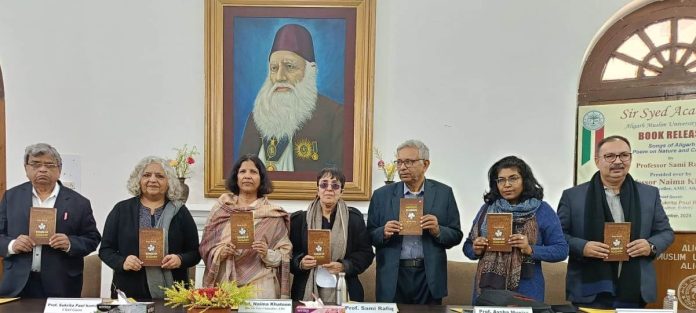Aligarh: “Songs of Aligarh,” a collection of poems on nature and culture by Prof Sami Rafiq generated an enlightening discussion on the effects of progress, ruin of natural environment and habitats, issues of identity and bonding with places, houses, trees, rivers and ponds, and portrayal of battles of everyday life by poets who entice hope for a better future.
The launch of the book, at a ceremony organised by the Sir Syed Academy, Aligarh Muslim University (AMU) by the distinguished poet, author and editor Professor Sukrita Paul Kumar and Prof Naima Khatoon, Vice Chancellor, AMU along with Professor Farhat Hasan, University of Delhi; award winning author Prof Shafey Kidwai, Director, Sir Syed Academy; and Prof Aysha Munira was attended by faculty members and students.
Prof Sukrita Paul Kumar saw Aligarh in the book as a metaphor which strikes a chord with readers living anywhere, whether Kenya where she spent her childhood or anywhere else. She noted that Sami Rafiq’s poems not just lament the past but also evince a hope about a better future. She also looked at the battles of everyday life which it documents and which find reflections in Songs of Aligarh, available on Amazon.
Prof Kumar called the poet an architect of thought in planning and structuring the book around animals, birds and trees. She particularly praised a poem which gives voice to a tree and articulates the environmental history of Aligarh Muslim University, beginning with Sir Syed.
AMU Vice Chancellor Prof Naima Khatoon, who joined the gathering a bit later, congratulated Prof Sami Rafiq for bringing out a collection of nature poems on Aligarh, which is perhaps the first such collection in English. She also commended Sir Syed Academy and its Director for organising literary discussions at regular intervals enriching the academic life of the AMU campus.
Prof Farhat Hasan praised the book for expressing a deep sense of anguish about environmental degradation. He said the poems not only express pain and anguish but also lament a rupture of organic link with nature, thanks to the powers of modernisation. He said the poems in the book restored his own ruptured relationship with his city Aligarh.
Prof Hasan noted a very strong expression of feeling in the book through the poet’s relationships with objects like houses, trees and ponds. Making a neat distinction between historians who document everyday life with that of a poet who articulates a different everyday nature of conflict, he praised the Songs of Aligarh, for documenting everyday conflict within a person and in his environment.
Pushing the conversations forward, Prof Shafey Kidwai drew a parallel between famous Urdu poet Majaz’s poem “Raat aur rail” and Rafiq’s “Aligarh Junction”, adding that romantic poets always speak of nature, but Rafiq’s poems are beyond romanticism, as these are concerned with everyday city life, degradation of environment, loss of flora and fauna and destruction of places and natural habitats.
Prof Aysha Munira Rasheed said, Songs of Aligarh by Sami Rafiq is an artistic representation or cityscape of a quaint town in Northern India called Aligarh.
Rafiq’s primary preoccupation in this collection is a profound lamentation and nostalgia for something evanescent: the flora and fauna and physical features of the town.
The imagery is tactile, olfactory with echoes and resonances of personal experience.
Poems such as “In Diggi Lake” are a dirge like many other poems to the natural phenomena being vandalised in the name of growth and development. Rafiq’s powerful phrase “…[t]he grand superstructure glitters/With neon lights of a smart city/There is no place even for ghosts” reminds one of the neon gods of “The Sound of Silence” in the 1964 American folk-rock song by Simon & Garfunkel.
She said there is a recurrent image of haunting ghosts of old urban legends that characterised a well-knit society of Aligarh are silenced by the neon lights of a smart city, the new gods of development, to whom the denizens bow and pray. Songs of Aligarh does not romanticise the cityscape or Nature. Far from it, while weaving and interweaving the stories where the human, the natural and the supernatural meet, it engages with nature and culture with a pressing political question, a question of survival.
Describing her love for nature and animals and her association with Aligarh and AMU, the author Prof Sami Rafiq, who also teaches a paper on Climate Change and Literature, said, place is an important metaphor for identity. Lamenting the ‘silences of relationship between nature and humans’, she noted that the founder of Deep Ecology Movement, Norwegian philosopher Arne Naess talked about the importance of places that give identity to human beings.
Prof Rafiq also recited a poem- “Once my Garden” from the book that has referred to the ‘demons of progress coming with concrete and cement and destroying the garden.
The programme concluded with a vote of thanks by Dr. Mohammad Shahid, Deputy Director, Sir Syed Academy. Dr Hussain Haider conducted the proceedings.




